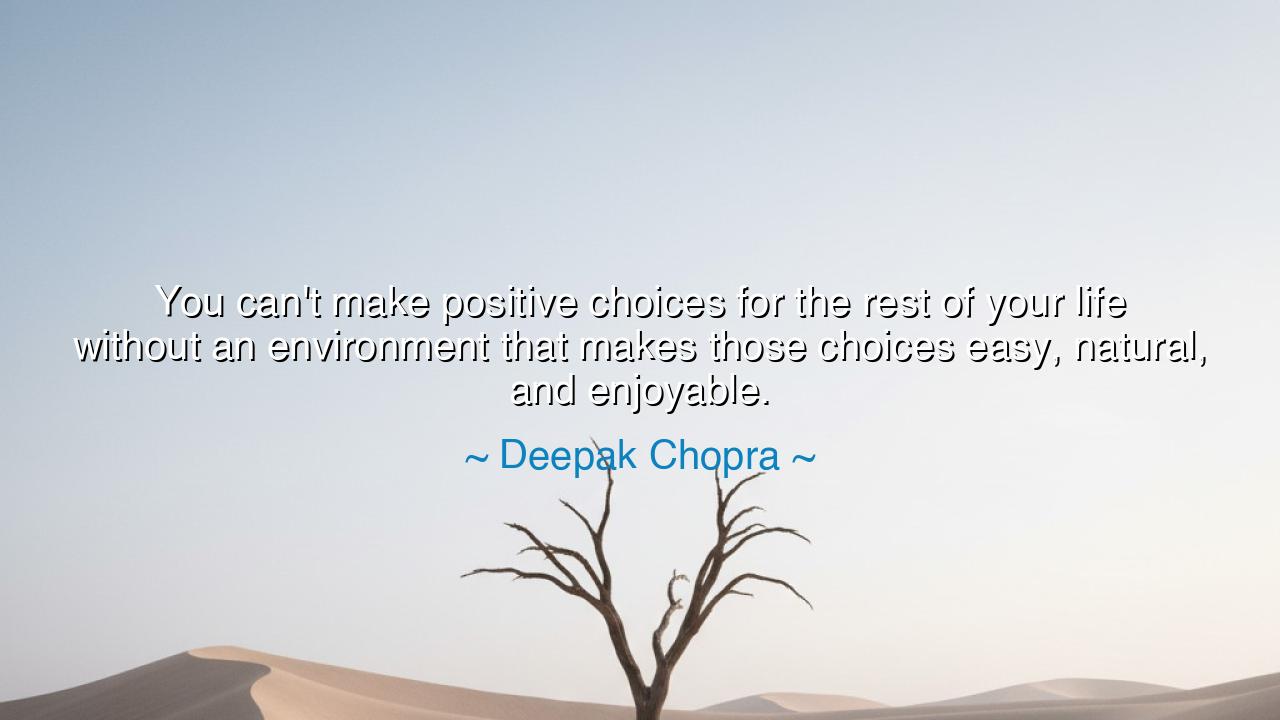
You can't make positive choices for the rest of your life without
You can't make positive choices for the rest of your life without an environment that makes those choices easy, natural, and enjoyable.






Hear, O seekers of wisdom, the words of Deepak Chopra, who declared: “You can’t make positive choices for the rest of your life without an environment that makes those choices easy, natural, and enjoyable.” In this utterance lies a truth as profound as the rivers that shape the valleys: a person is not only the architect of their will, but also the child of their surroundings. For even the strongest seed must have good soil to grow, and even the bravest spirit falters if it dwells in an atmosphere poisoned by vice and despair.
The origin of this wisdom comes from Chopra’s teachings on the union of mind, body, and spirit. He recognized that human beings often blame themselves when they falter, believing their failure lies solely in weakness of will. Yet he reminds us that willpower alone is not enough; we must also create environments—homes, communities, friendships—that support goodness. Just as one cannot swim against the ocean forever, so too one cannot live a life of positive choices if their daily world pulls them endlessly toward destruction.
Consider the meaning. To make a single right decision is noble; to make them daily, for a lifetime, requires more than discipline—it requires harmony with the world around you. If one lives among those who mock virtue, kindness becomes a burden. If one dwells in a place where unhealthy food abounds and rest is neglected, wellness becomes a battle. But if one is surrounded by love, encouragement, and beauty, then the path of virtue is not a punishment but a joy. The environment shapes the rhythm of choice, making goodness flow as naturally as water down a mountain.
History offers its testimony. Think of Mahatma Gandhi, who sought to live a life of truth and simplicity. He did not attempt this in isolation, but built an ashram, a community whose daily practices supported the virtues he pursued. In that environment, humility, service, and nonviolence became as natural as breath. Contrast this with the fate of many rulers who, though wise in youth, were corrupted by courts filled with flattery, greed, and indulgence. Their inner strength, without a healthy environment, withered into weakness.
This truth is also seen in the story of Benjamin Franklin, who in his youth sought to cultivate virtues such as temperance, humility, and frugality. He quickly learned that his progress faltered when his companions encouraged idleness or waste. Thus, he deliberately chose companions who uplifted his efforts, forming circles of mutual encouragement. His life shows that greatness is rarely forged in solitude, but in environments that nourish virtue and excellence.
The meaning for our own age is urgent. Many strive for health, peace, or discipline, yet remain chained to surroundings that sabotage their efforts: toxic relationships, chaotic homes, or cultures that glorify greed and excess. Chopra’s words call us to remember that lasting positive choices demand more than inner resolve—they demand the courage to change the world around us. To expect yourself to live righteously in a poisoned atmosphere is to demand the impossible.
The lesson for us is clear. Build environments of virtue. Choose companions who encourage your better self. Shape your homes so that peace, gratitude, and health are easy to practice. Fill your days with beauty—books that inspire, meals that nourish, conversations that uplift. And if your current environment drags you down, have the courage to change it, little by little, until it supports your soul’s growth.
Thus let the words of Deepak Chopra endure: “You can’t make positive choices for the rest of your life without an environment that makes those choices easy, natural, and enjoyable.” Remember them as both challenge and guide. For though the will begins the journey, it is the environment that sustains it, making the path of goodness not only possible but joyful, not only enduring but eternal.






AAdministratorAdministrator
Welcome, honored guests. Please leave a comment, we will respond soon